Film Name: 三大队 / Endless Journey
Let’s get this straight, Endless Journey is a good looking film and has many fine points that make it worth the two hours or so it takes to enjoy it.
Based on true events (the prototype of the story, ‘Please tell the Chief that the 3rd Brigade mission is accomplished’ is feared to be even better than the film), the film tells the story of how a group of stubborn people are transformed by life and how they let go of and hold on to their own obstinacy, which is our heroism no matter how we choose to go about it.
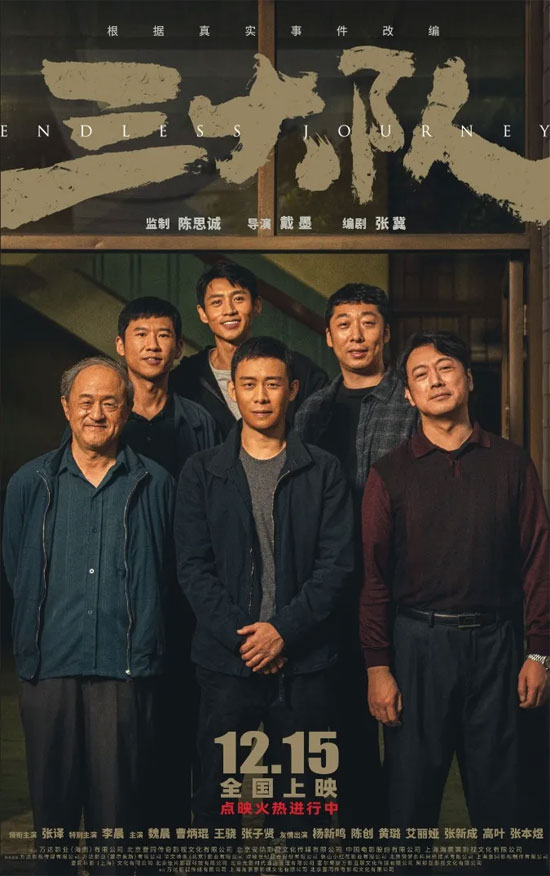
When I got back from the screening, I went back to the article I wrote about Fireflies in the Sun two years ago and watched it again – it was Endless Journey director Dai Mo’s first independent feature film, and even though the film wasn’t very well-received at the time, I gave him the following reviews Although the film was not well received at the time, I still gave him a rating of ‘good foundation, solid enough, and patient’.
Now it seems that after acquiring a quality subject matter and changing his genre style, along with the right adaptation and performances, Dymer is finally able to make a good film by exploiting his strengths and avoiding his weaknesses.
[Friendly reminder: there will be spoilers below].
There’s a clever, extremely dramatic aspect to Endless Journey that I only gradually smacked the flavour of as I was preparing to write the text: two lines from veteran criminal police officer Zhang Qingliang that highly encapsulate and influence the entire story.
One is true: ‘When people are young, they want to work on big cases, but do you know how many people behind big cases have changed their lives.’
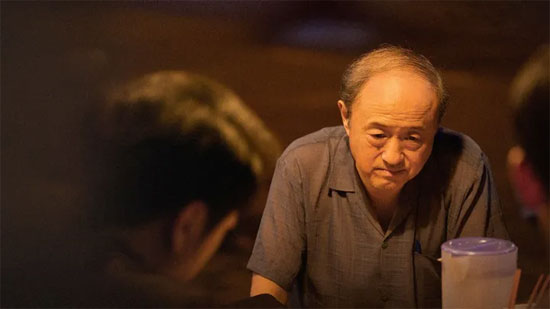
Lao Zhang utters this insight because Xu Yizhou, a newcomer who has just joined the Third Brigade, is eager to solve the rape and murder case. Cheng Bing and other team members are not as excited as Xu, but they all likewise regard the solving of the case as a responsibility, an honour and a merit to be aspired to – Lao Zhang longs for a bland expectancy, a condensation of the main theme of the film in one anticlimactic write-up.
There is also a line of lies. Lao Zhang did not catch up with the suspect Wang Eryong, but lied that he was knocked down by the other side, and when he was hospitalised the next day with a cerebral haemorrhage, everyone thought that it was a work-related injury caused by chasing the murderer.
Why did Lao Zhang lie? On the one hand, he wanted to cover up his old age and strength of the dilemma, on the other hand, he wanted to maintain the three brigades just straight not bend the image of the majesty of the three brigades can be defeated by a strong enemy, but absolutely can not shout ‘no’ – nearly retired old Zhang, although he has seen and understood the excessively rigid Although old Zhang, who is approaching retirement, has already understood the problem of excessive rigidity, he still unconsciously maintains his rigidity when things go wrong.
If it is not because of this lie, Cheng Bing they heard the news of the death of the old Zhang, may not be so angry, and then accidentally killed the suspect Wang Dayong …… In other words, the entire three brigades have been ‘rigid is easy to break’ of the backlash.
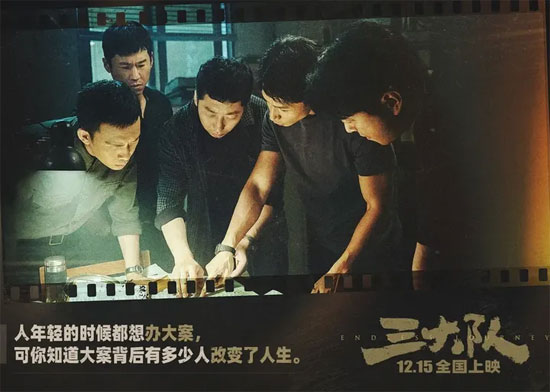
I have a deep impression of a remark made by the Commissioner at the time. When the Bureau was unable to certify Lao Zhang’s injury due to the lack of proof, the Commissioner told Cheng Bing something to the effect that ‘the people believe in us police officers not because of the uniform, but because of the system.’
Regardless of whether Lao Zhang’s cerebral haemorrhage had anything to do with the arrest of the suspect, the chief was right to act according to the rules (if there are difficulties, he will find another way), and as a police officer, he should uphold procedural justice, even if he encounters all sorts of seemingly sensible but irrational things.
Therefore, even from the people’s simple concept of good and evil, the three brigades of criminal police officers killed a scumbag should not be severely punished, the judicial system out of principle considerations, but also must be given to the wrong people to punish, no rules can not be round.
This is ‘Endless Journey’ the first quarter of the story, and the film really wants to talk about, when people lose the constraints and protection of the system, how to re-face the heart to punish evil and promote goodness of the heart of the original heart, as well as to choose how to choose the heroism.
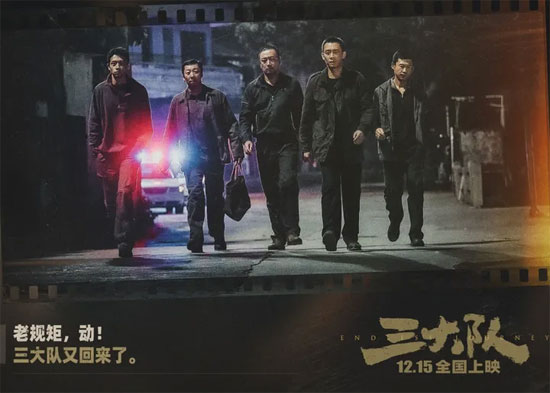
Cheng Bing after his release from prison to lead the original team of three brigade once again embarked on the journey to arrest the murderer, is undoubtedly the most combustible section of the film, because that is the fast and furious way of martial arts film: the former criminal police has been white body, but did not take off the heart of the police uniform, relying on the past experience and passionate rooted in the dust, the crowd searching for the people, but seek to be blameless in the heart.
Interestingly, in the absence of police support, the three brigades rely on more grey ‘jianghu morality’ – in the detention centre in the red brother, ultimately chose a good man Cheng Bing to pay for the aftermath of the relationship, and because of this relationship, the three brigades to take to smash the human trafficking gang as a pitch to get a lead on Wang Eryong.
Of course, if ‘Endless Journey’ simply carries out this kind of ‘persistent’ personal heroism to the end, it would be the downfall of face painting, because there exists a kind of heroism in the world that is more common, more ordinary, and closer to the general public, and it is called ‘life’. It is called ‘life’.
Cheng Bing notebook that ‘no one can live in a vacuum’, not only to write those fugitives from justice, but also to write their own police officers in the red dust.
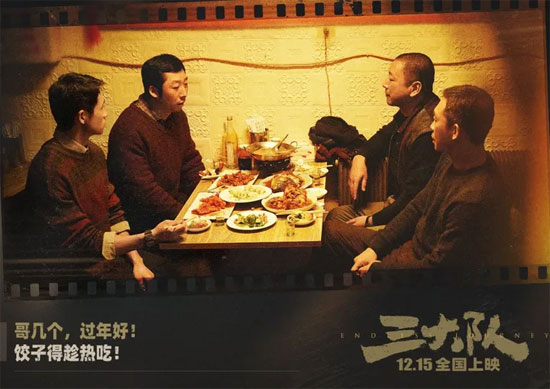
Ma Zhenkun is sentenced to five people in the most fortunate, he has a wife of their own unswerving, hard work to earn money, pulling children, for the elderly to send the end of the day, so Ma Zhenkun is also the earliest to fall out of a person, because he owes people;
Liao Jian has always been attached to the son of the fight alone, stingy he did before saying goodbye, is to send Ma Zhenkun two cigarettes, spend a huge sum of money for Cheng Bing and others each bought an accident insurance;
Xu Yizhou was the most unattached young man, but he met a girlfriend who could make him start over, and he was unwilling to give up easily;
Cai Bin’s situation is similar to Cheng Bing’s, and he is (almost) all alone; he is also the person who has followed Cheng Bing the longest, and apart from his deteriorating health, what really prompts him to give up is his sense of letting go of his obsession;
The last remaining Cheng Bing, there is also a moment of chase can not be, he finally understood, he gave up everything around the pursuit of murder, seems to walk in the way forward, in fact, has been trapped in the haze of the past, the remaining empty holes in the rags, insisted on so long I do not know if it’s right, but let go of the obsession of choosing to live is certainly right.
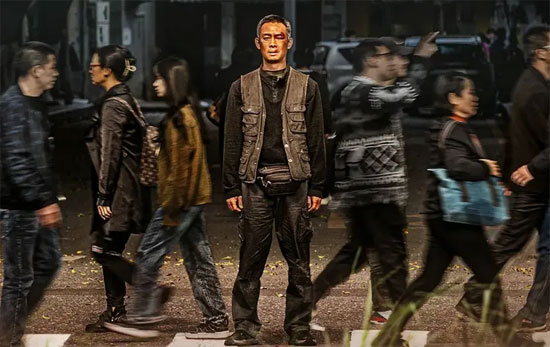
In the end, Cheng Bing catches up with Wang Eryong, a consolation to the three brigades for their years of sacrifices and grievances. Good and evil will be rewarded in the end; young grass is afraid of frost and the sun, and the wicked still need to be stubborn.
Watching Cheng Bing’s relief at getting what he wants, his and the audience’s previous questions are answered: it is of course right to persevere to the end, not for any other reason than to fight for a breath of air and to seek a reason.
The whole ‘Endless Journey’ look down very smooth, the rhythm of the right relaxation, the most crucial thing is that such a film could have been shot very emotional film, but has been collected in the shooting of emotions, only a few bridges only burst out extremely strong feelings, the balance is very good, to do the mood of introspection without losing the fullness of the texture.
I can’t help but think of director Dai Mo’s last film, Fireflies in the Sun, where the suspense part wasn’t filmed well, and the emotional part was a bit overdone, so I think it was to match the producer Chen Sicheng’s ‘path dependence’ to make a remake of a suspense film, which made the effect of the finished film slightly unbalanced… …
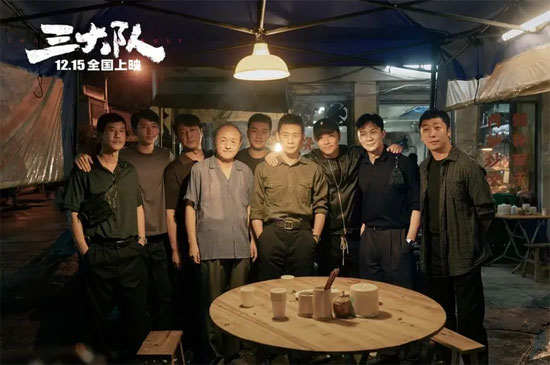
And this time they began to change, no longer adhere to the past to make their ‘box office success’ of the biggest experience, no longer the pursuit of suspense, crime, remake, overhead Southeast Asia and other elements, but to adapt the local good book, to shoot a solid belong to our own good story.
In more and more peers to follow suit, began to pursue ‘remake IP, in Southeast Asian countries to shoot suspense crime film’ at the same time, the number of this way to carry forward and unparalleled success of Chen Sicheng, but began to change the track, to achieve the ‘no one I have, people have I change’.
Although I don’t have much goodwill towards Chen Sicheng, I have to admit that he does have a knack for it. Regardless of how much Endless Journey ends up doing at the box office, based on the quality of the film, I’d have to say that the ‘Chen Sicheng Cinematic Universe’ has won once again.
Please specify:Anime Phone Cases » Endless Journey 2023 Film Review: The Heroism of Mendacity